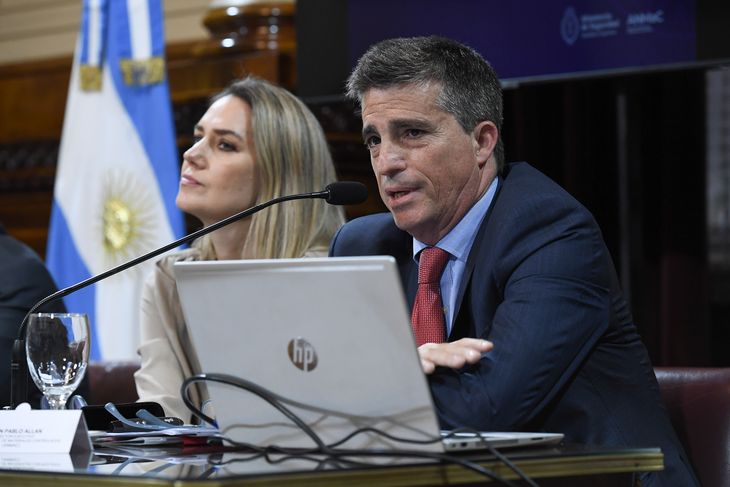Fernando Brovelli Report.-
This Wednesday the Senate of the Nationwhose agenda was centered on projects relevant to security, which even modify the Penal Code. On Tuesday, her own Minister of Security, Patricia Bullrichhighlighted the importance of these reforms in the Chamber of Deputies. It was striking absence of the senators from the Union for the Homeland bloc and, in that framework, consensus in the plenary took precedence.
The most influential project is the one that proposes a Comprehensive Approach against Organized Crimealso called anti-mafia law. The initiative comes with half a sanction from Deputies and proposes collectivizing sentences for all people who are considered members of illicit associations, in addition to establishing special regimes for the discretionary exercise of security forces.
Other proposals that entered the Upper House after being approved in the Deputies are those pertinent to the regularization of firearms and to the extension of the national voluntary surrender of firearms program. On the other hand, a project that aims to apply a legal regime for the dismantling of automobiles and sale of their auto partsas well as a regulatory framework for abandoned, lost, seized or hijacked vehicles.
In the plenary session of the Security and Justice commissions, executive branch officials from around Bullrich itself were present: Juan Pablo Allanexecutive director of National Agency for Controlled Materials (ANMaC), and Fernando SotoNational Director of Regulations and Judicial Liaison of the Ministry of National Security. “Our Penal Code It is 132 years old and was not designed for what happens to us. Crime changes very quickly, because it has another dynamic,” Soto stated regarding the anti-mafia law.
Dialogues Senate Commission
Senators from the UCR, liberalism and the PRO.
Senate
Anti-mafia law: what the project says
The project of Comprehensive Approach against Organized Crimealso known as anti-mafia lawtypifies organized crime in a list of crimes and establishes that this type of association exists when its purpose is “the provocation of fear of executive authoritieslegislative or judicial”, when “the Mechanisms established to enforce the law are notoriously insufficient to stop a chain of criminal acts”, or when “there is threatened by the actions of members of one or more organizations with similar objectives, the real property of the National State“.
In this framework, it aggravates the penalties for those who are considered members of an illicit association and collectivizes sentences for all members of the criminal group: “It will be punished with the penalty that corresponds to the most serious crime committed by the organization.” In another sense, it establishes “Area Subject to Special Investigation”where emergency action mechanisms will be applied in territories that are considered priority.
Within the framework of this regime the Federal forces can detain a person for up to 48 hours for presumption of guilt to carry out investigationsfreeze their assets and intercept “telephone calls, social media messaging, virtual platforms and other forms of communication.” will be implemented advance seizures of any property that is the product of the activities described in the law. Even without a conviction, these assets will become the domain of the corresponding national and provincial State.
In reference to anticipated confiscation, Fernando Soto considered that “it is okay for a judge, with due caution, to make the decision to do so and If for some eventuality the person is acquitted, the property or the value of the property is returned. This aims to disarm the economic power of the organizations.” When consulted, the official admitted that “There is a constitutional clash. “He is innocent and has no conviction, it is true, but it is not the only statute that affects fundamental and constitutional guarantees without a final sentence, think about the prosecution itself or preventive detention.”
Weapons regularization in Argentina
Juan Pablo Allanexecutive director of National Agency for Controlled Materials (ANMaC)was the representative of the Executive Branch to support the project of regularization of firearms, which could become law if the Senate approves it. That would imply a 360-day window to legalize weapons that are not registered by the country’s users, through of a digital mechanism and with an economic incentive (for which the Government stipulated an amount of $57 million).
Juan Pablo Allan

Juan Pablo Allan, executive director of the National Agency for Controlled Materials (ANMaC).
Senate
In turn, the ruling party seeks the sixth extension of the National Voluntary Surrender of Firearms Programwhich is usually carried out for a period of two years but the current initiative seeks to last until 2028. “It is not that the State automatically approves the regularization; there is a process of study of the weapon and the person“he clarified.
“The Argentine registration system, so robust and imitated by other countries in the region and the world, In practice it has lost effectiveness“, analyzed and specified that There are nearly 300,000 legitimate users with more than 800,000 weapons in the countrywhile some 600,000 people have let their license expire (according to the official, due to “the distance that bureaucracy has generated”), who had previously declared a total of 986,054 weapons.
“The user is an ally in this because he is attached to the law“, he qualified and understood that “today as a State we are failing because we cannot provide citizens with all the information they require.”Weapons exist, someone has them and the State needs to know who has them. In exchange, as in all regularization, the sanctions of article 189 bis of the Penal Code on the illegitimate possession of weapons, in exchange for being honest about your situation,” he stated.
Source: Ambito




